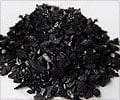A method has been devised by Georgia Institute of Technology researchers to capture, store and finally recycle carbon from vehicles so that pollution can be prevented.
A method has been devised by Georgia Institute of Technology researchers to capture, store and finally recycle carbon from vehicles so that pollution can be prevented.
The researchers hope that their strategy may pave the way for a zero emission car, and a transportation system completely free of fossil fuels.The researchers say that the sustainable transportation system they dream to develop is based on liquid fuel, and a process to trap carbon emission in the vehicle for its retransformation into the fuel. Currently, they are working on a fuel-processing device to separate the carbon, and to store it in the vehicle in liquid form.
“Presently, we have an unsustainable carbon-based economy with several severe limitations, including a limited supply of fossil fuels, high cost and carbon dioxide pollution,” said Andrei Fedorov, associate professor in the Woodruff School of Mechanical Engineering at Georgia Tech and a lead researcher on the project.
“We wanted to create a practical and sustainable energy strategy for automobiles that could solve each of those limitations, eventually using renewable energy sources and in an environmentally conscious way,” Fedorov added.
Georgia Tech’s near-future strategy involves capturing carbon emissions from conventional (fossil) liquid hydrocarbon-fuelled vehicles with an onboard fuel processor designed to separate the hydrogen in the fuel from the carbon.
The researchers settled on a hydrogen-fuelled vehicle for its carbon capture plan because pure hydrogen produces no carbon emissions when it is used as a fuel to power the vehicle.
Advertisement
After the carbon dioxide is separated from the hydrogen, it can then be stored in liquefied state on-board the vehicle. The liquid state provides a much more stable and dense form of carbon, which is easy to store and transport.
“We had to look for a system that never dilutes fuel with air because once the CO2 is diluted, it is not practical to capture it on vehicles or other small systems,” said David Damm, PhD candidate in the School of Mechanical Engineering, the lead author on the paper and Fedorov’s collaborator on the project.
The research was published in Energy Conversion and Management.
Source-ANI
KAV/L






